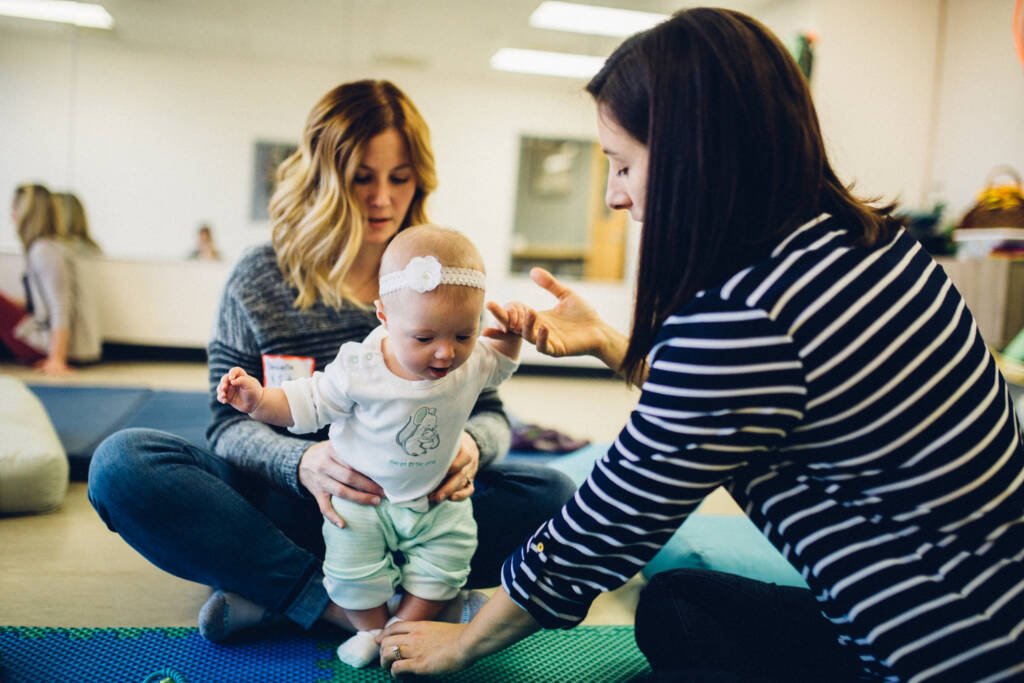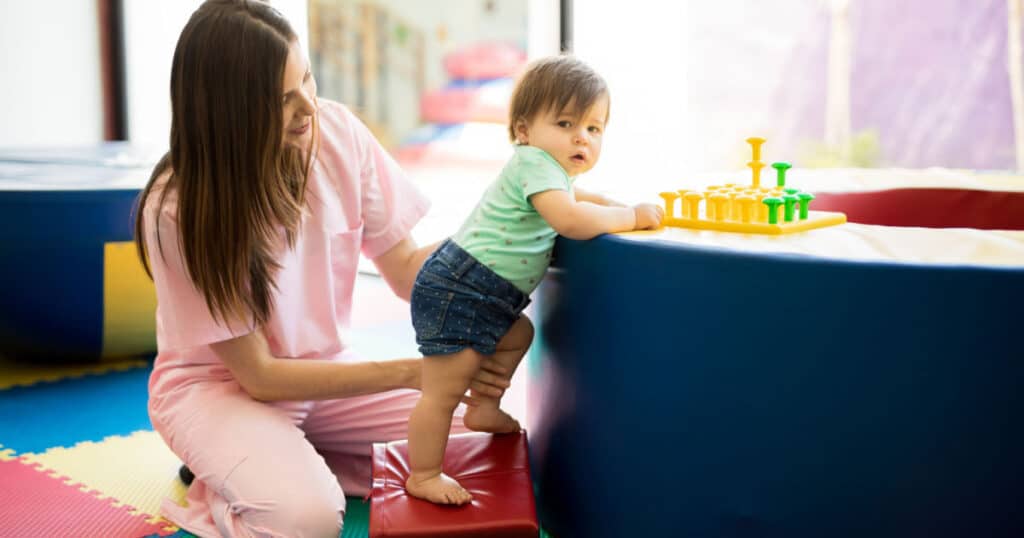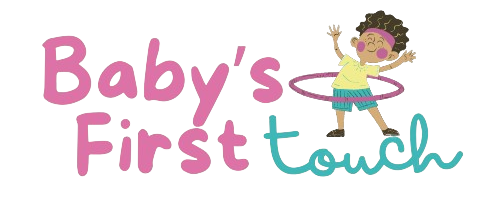Early development in babies is crucial as it lays the foundation for their future growth and abilities. During these formative years, the role of therapy can be pivotal in supporting and enhancing a baby’s development. This comprehensive guide explores various therapies, their benefits, and how parents can actively support their baby’s developmental journey.
Understanding Baby Development Milestones
Developmental milestones are indicators of a baby’s growth and progress in various areas.
Physical Development Milestones
Physical milestones include rolling over, sitting up, crawling, and walking. Monitoring these milestones helps identify areas where a baby may need additional support.
Cognitive Development Milestones
Cognitive development milestones involve learning, thinking, problem-solving, and understanding the environment. These include recognizing familiar faces, responding to their name, and exploring objects.
Social and Emotional Development Milestones
Social and emotional milestones encompass a baby’s ability to interact with others and express emotions. Smiling, showing curiosity, and forming attachments are key indicators of social and emotional growth.
Types of Therapies for Babies
Therapies tailored for babies address specific developmental needs, promoting holistic growth.
Physical Therapy
Physical therapy focuses on enhancing physical development, strength, and coordination.
Benefits and Goals
The goals of physical therapy include improving motor skills, balance, and muscle tone, which are crucial for physical activities like crawling and walking.
Common Techniques
Techniques such as guided movement exercises, balance training, and strength-building activities are commonly used in physical therapy.
Occupational Therapy
Occupational therapy aids in developing fine motor skills and sensory processing abilities.
Benefits and Goals
This therapy aims to enhance a baby’s ability to perform daily activities, improving hand-eye coordination and sensory integration.
Common Techniques
Techniques include sensory play, grasp and release exercises, and activities that enhance visual-motor integration.
Speech and Language Therapy
Speech and language therapy supports the development of communication skills.
Benefits and Goals
The primary goals are to encourage vocalization, develop language comprehension, and facilitate effective communication.
Common Techniques
Therapists use techniques like interactive reading, repetitive sounds, and play-based language activities to stimulate speech development.
Sensory Integration Therapy
Sensory integration therapy helps babies process and respond to sensory information.
Benefits and Goals
The therapy aims to improve sensory processing, helping babies respond appropriately to different stimuli.
Common Techniques
Techniques include sensory play with various textures, balance exercises, and activities that stimulate the five senses.

Identifying Developmental Delays
Recognizing signs of developmental delays early can ensure timely intervention.
Signs of Physical Development Delays
Signs include not reaching milestones like sitting up, crawling, or walking within the expected time frame.
Signs of Cognitive Development Delays
Indicators of cognitive delays include difficulty in recognizing familiar people or objects, and slow response to stimuli.
Signs of Social and Emotional Development Delays
Delays in social and emotional development can be identified if a baby does not show interest in social interactions or has trouble forming attachments.
When to Seek Professional Help
Early intervention is key to addressing developmental delays effectively.
Importance of Early Intervention
Early intervention can significantly improve outcomes for babies with developmental delays, providing the support needed for optimal growth.
Consulting with Pediatricians and Specialists
Consulting with pediatricians and specialists can help in diagnosing developmental issues and planning appropriate therapeutic interventions.
Creating a Supportive Home Environment
A supportive home environment is essential for therapy to be effective.
Safe and Stimulating Play Areas
Create safe and stimulating play areas that encourage exploration and learning. Use age-appropriate toys and activities to promote development.
Incorporating Therapy Techniques at Home
Incorporate therapy techniques into daily routines to reinforce skills learned during sessions.
Importance of Routine and Consistency
Establishing a consistent routine helps in creating a sense of security and stability, which is beneficial for developmental progress.
Parental Involvement in Therapy
Active parental involvement is crucial in supporting therapy.
Role of Parents in Supporting Therapy
Parents play a vital role by participating in therapy sessions, practicing techniques at home, and providing emotional support.
Tips for Effective Parent-Therapist Collaboration
Maintain open communication with therapists, set realistic goals, and be consistent with therapeutic activities to maximize benefits.
Physical Therapy Activities
Engage in physical therapy activities to support your baby’s physical development.
Tummy Time Exercises
Tummy time strengthens neck and shoulder muscles, preparing babies for crawling and other motor skills.
Crawling and Walking Assistance
Assist your baby in crawling and walking through guided movement and supportive exercises.
Strength and Coordination Activities
Incorporate activities like reaching for toys and gentle stretching to build strength and coordination.
Occupational Therapy Activities
Support fine motor skills and sensory development with occupational therapy activities.
Fine Motor Skills Development
Encourage fine motor skills with activities like picking up small objects and stacking blocks.
Sensory Play Ideas
Engage in sensory play with different textures, sounds, and colors to stimulate sensory processing.
Hand-Eye Coordination Exercises
Activities like throwing and catching soft balls or playing with shape sorters can enhance hand-eye coordination.
Speech and Language Therapy Activities
Boost communication skills with targeted speech and language therapy activities.
Encouraging Babbling and First Words
Encourage babbling and first words through repetitive sounds, singing, and talking to your baby.
Storytelling and Reading Aloud
Reading aloud and storytelling stimulate language development and comprehension.
Interactive Communication Games
Play interactive games like peek-a-boo and naming objects to promote communication skills.
Sensory Integration Therapy Activities
Incorporate sensory integration activities to help your baby process sensory information.
Sensory Play with Textures and Materials
Use different textures and materials in play to enhance sensory experiences.
Balance and Movement Exercises
Engage in balance and movement exercises like gentle rocking and swaying to improve sensory integration.
Calming Techniques for Sensory Overload
Use calming techniques like soft music and gentle touch to help your baby cope with sensory overload.

Utilizing Technology in Therapy
Technology can be a valuable tool in supporting your baby’s therapy.
Educational Apps and Games
Use educational apps and games designed for developmental support to engage your baby in learning activities.
Virtual Therapy Sessions
Participate in virtual therapy sessions if in-person visits are not possible, ensuring continuity in therapy.
Monitoring Progress with Digital Tools
Track your baby’s progress using digital tools and apps that provide insights and suggestions for continued support.
Nutrition and Its Impact on Development
Proper nutrition is vital for your baby’s development.
Importance of a Balanced Diet
A balanced diet provides essential nutrients that support brain and physical development.
Nutrients Essential for Brain and Physical Development
Ensure your baby gets sufficient vitamins, minerals, proteins, and fats crucial for growth and development.
Feeding Challenges and Solutions
Address feeding challenges with strategies like introducing new foods gradually and creating a positive mealtime environment.
Understanding and Supporting Emotional Needs
Emotional well-being is as important as physical health.
Recognizing and Responding to Baby’s Emotions
Be attentive to your baby’s emotions and respond with comfort and reassurance.
Building a Secure Attachment
Build a secure attachment through consistent, loving interactions and being responsive to your baby’s needs.
Encouraging Positive Social Interactions
Facilitate positive social interactions by exposing your baby to different social settings and modeling positive behaviors.
The Role of Play in Development
Play is a fundamental aspect of development.
Different Types of Play and Their Benefits
Engage in different types of play, including sensory play, constructive play, and pretend play, to support various developmental areas.
Incorporating Therapeutic Play into Daily Routine
Incorporate therapeutic play activities into daily routines to make learning and development fun and engaging.
Encouraging Independent Play
Encourage independent play to foster creativity, problem-solving skills, and self-confidence.
Engaging with Community Resources
Leverage community resources to support your baby’s development.
Finding Local Support Groups
Join local support groups to connect with other parents and share experiences and advice.
Accessing Early Intervention Programs
Utilize early intervention programs that offer specialized support and resources for developmental delays.
Utilizing Community Centers and Libraries
Take advantage of community centers and libraries that provide programs and activities for young children.
Tracking and Celebrating Progress
Celebrate your baby’s progress to motivate continued development.
Keeping a Developmental Journal
Maintain a developmental journal to track milestones and note any areas of concern or achievement.
Setting Achievable Goals
Set realistic, achievable goals for your baby’s development and celebrate when these goals are met.
Celebrating Milestones and Successes
Celebrate developmental milestones and successes with positive reinforcement and encouragement.
Handling Challenges and Setbacks
Prepare for and manage challenges and setbacks effectively.
Coping with Frustration and Stress
Develop coping strategies for frustration and stress, such as seeking support and taking breaks when needed.
Seeking Support from Friends and Family
Lean on friends and family for support, advice, and assistance in managing developmental challenges.
Maintaining a Positive Outlook
Maintain a positive outlook by focusing on progress and celebrating small victories, keeping motivation high.
Future Planning and Continued Support
Plan for future developmental needs and ongoing support.
Transitioning to Preschool and School
Prepare for transitions to preschool and school by familiarizing your baby with new environments and routines.
Ongoing Therapy and Support
Continue therapy and support as needed to ensure ongoing development and address any new challenges.
Preparing for Long-Term Developmental Goals
Set long-term developmental goals and create a plan to achieve them, adapting as necessary to support your baby’s growth.


